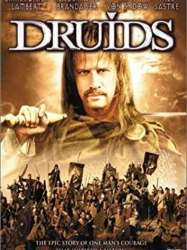Films with theme "Histoire de France", sorted by revenue

Story of Women (1988)
, 1h50Directed by Claude Chabrol
Origin France
Genres Drama
Themes Feminist films, Pregnancy films, Politique, Films about sexuality, Political films, Histoire de France, L'Occupation allemande en France
Actors Isabelle Huppert, François Cluzet, Nils Tavernier, Marie Trintignant, Dominique Blanc, Lolita Chammah
Under the German military administration in occupied France during World War II. Paul Latour is a prisoner of war in Germany and his wife Marie lives hand-to-mouth with their two children in a squalid flat. A neighbour, whose husband is also in Germany, has fallen pregnant and is trying to lose the baby. Marie helps her, successfully. Other women come to her and she starts charging.

The Hostage of Europe (1989)
, 2h4Directed by Jerzy Kawalerowicz
Origin Pologne
Genres Drama, Historical
Themes Histoire de France, Napoleonic Wars films
Actors Roland Blanche, Vernon Dobtcheff, Didier Flamand, François Berléand, Ronald Guttman, Isabelle Petit-Jacques
Chronique de la détention de Napoléon sur l'ile de Sainte-Hélène, ses relations avec son entourage et ses affrontements avec Hudson Lowe, le gouverneur britannique.

The Austrian (1990)
, 1h38Directed by Pierre Granier-Deferre
Origin France
Genres Drama, Historical
Themes Politique, Marie-Antoinette, Political films, Histoire de France, Films about royalty
Actors Ute Lemper, Patrick Chesnais, Philippe Leroy, Daniel Mesguich, Rufus, Pierre Clémenti
Le film évoque les derniers jours de Marie-Antoinette d'Autriche interprétée par Ute Lemper, de son procès à son exécution. Il fut tourné lors des célébrations du bicentenaire de la Révolution française. Sur un scénario d'Alain Decaux et d'André Castelot reposant sur les minutes du procès de la reine, L'Autrichienne est en grande partie un huis clos (scènes du procès, et à la Conciergerie), ponctué de séquences en flash-back.

Chocolat (1988)
, 1h45Directed by Claire Denis
Origin France
Genres Drama
Themes Films set in Africa, La colonisation française, Histoire de France
Actors François Cluzet, Isaac de Bankolé, Giulia Boschi, Jean-Claude Adelin, Mireille Perrier, Jacques Denis
The film begins with an adult woman named France, walking down a road toward Douala, Cameroon. While walking, she is picked up by William J. Park (Emmet Judson Williamson), an African American who has moved to Africa and is driving to Limbe with his son. As they ride, France's mind drifts and we see her as a young girl in Northern French Cameroon where her father was a colonial administrator. The story is conducted through the eyes of young France, showing her friendship with the "houseboy", Protée, as well the sexual tension between him and her young and beautiful mother, Aimée. The conflict of the film comes from the discomfort created as France and her mother attempt to move past the established boundaries between themselves and the native Africans. This is brought to a head through Luc Segalen (Jean-Claude Adelin), a Western drifter who stays with the Dalens family after a small aircraft crashes nearby. He makes public the evident sexual attraction between Aimée and Protée, prompting the mother to act on her desire. This results in a fight between Luc and Protée, who consequently loses his in-house job and is moved to work outdoors in the garage as a mechanic.

Chouans! (1988)
, 2h25Directed by Philippe de Broca
Origin France
Genres Drama, War, Historical
Themes Political films, Histoire de France, French Revolution films
Actors Sophie Marceau, Philippe Noiret, Lambert Wilson, Stéphane Freiss, Roger Dumas, Jean-Pierre Cassel
In 1793, during the French Revolution, a young woman named Céline (Sophie Marceau), who was adopted by Count Savinien de Kerfadec, must choose between two men who have been raised like her brothers, Tarquin Larmor (Lambert Wilson) and Aurèle de Kerfadec (Stéphane Freiss), while they take opposite sides in the conflict. Tarquin, also adopted by the Count, is a partisan of the New Republic and defends the new political system; Aurèle, the Count's natural son, supports the Royalist side. Both sons are in love with Céline. After the Republican Army decimates Western France, an insurgence of peasants, clergy, and aristocrats loyal to the Royalists stage a counterrevolution.

Dien Bien Phu (1992)
, 2h11Directed by Pierre Schoendoerffer
Origin France
Genres Drama, War
Themes French war films, La colonisation française, Politique, La guerre d'Indochine, Political films, Histoire de France
Actors Donald Pleasence, Jean-François Balmer, Patrick Catalifo, Maxime Leroux, Ludmila Mikaël, François Negret
The movie follows the chronological events of the battle. Some of them are shown in situ, from the heart of the battle, at Dien Bien Phu, while others are reported by civilians at Hanoi city or by paratroopers at Hanoi's civilian airport.

The Eye of Vichy (1993)
, 1h50Directed by Claude Chabrol
Origin France
Genres Documentary
Themes Films about films, Films about racism, Films about religion, Documentary films about business, Documentary films about the film industry, Documentary films about racism, Documentary films about law, Documentary films about war, Documentary films about historical events, Documentaire sur une personnalité, Documentary films about religion, Political films, Films about Jews and Judaism, Documentary films about World War II, Documentary films about films, Histoire de France, L'Occupation allemande en France
Actors Michel Bouquet, Brian Cox
Le film propose une sélection des actualités du régime de Vichy (d'août 1940 à août 1944) montée de manière chronologique. Aucun commentaire ne les accompagne. Le film « n'en a pas besoin », comme l'a expliqué Chabrol lors de la présentation de son travail.

Les Miserables (1995)
, 2h54Directed by Claude Lelouch
Origin France
Genres Drama, Historical
Themes Political films, Histoire de France, L'Occupation allemande en France
Actors Jean-Paul Belmondo, Michel Boujenah, Alessandra Martines, Philippe Léotard, Annie Girardot, Salomé Lelouch
As the film opens, Henri's father, a chauffeur, is falsely accused of the murder of his boss. During his trial and imprisonment, Henri's mother finds a job in a tavern on a Normandy beach. There Henri sees a movie version of Les Misérables. His father dies attempting to escape from prison, and upon hearing the news Henri's mother commits suicide. Henri grows up an orphan and learns to box.

Beaumarchais the Scoundrel (1996)
, 1h40Directed by Édouard Molinaro, Vincent Trintignant, Robert Kechichian
Origin France
Genres Comedy-drama, Adventure, Historical, Romance
Themes Films about writers, Politique, Théâtre, Political films, Films based on plays, Histoire de France, Films about royalty
Actors Fabrice Luchini, Sandrine Kiberlain, Manuel Blanc, Claire Nebout, Jean-Claude Brialy, Michel Serrault
L'année 1773 : le XVIII siècle peaufine son dernier acte. Louis XV s'apprête à quitter la scène, et en coulisses, déjà, Louis XVI se prépare. C'est le temps des grandes idées, et des mauvais sujets. Pierre-Augustin Caron de Beaumarchais, fils d'horloger, horloger lui-même, trouvait avec Voltaire que les pendules de son temps retardaient dangereusement. Il allait s'employer à les remettre à l'heure...

The Lady and the Duke (2001)
, 2h9Directed by Éric Rohmer
Origin France
Genres Drama, War, Biography, Comedy, Historical, Romance
Themes Political films, Histoire de France, French Revolution films
Actors Jean-Claude Dreyfus, Lucy Russell, Rosette, François Marthouret, Serge Renko, François-Marie Banier
Le film présente le point de vue d'une aristocrate anglaise, Grace Elliott, pendant la Révolution française. C'est une amie proche du duc d'Orléans (Philippe Égalité).

A Self-Made Hero (1996)
, 1h47Directed by Jacques Audiard
Origin France
Genres Drama, War, Comedy, Comedy-drama
Themes Histoire de France, L'Occupation allemande en France
Actors Mathieu Kassovitz, Albert Dupontel, Anouk Grinberg, Sandrine Kiberlain, Jean-Louis Trintignant, Nadia Barentin
Albert Dehousse has grown up on heroic novels, unfortunately his life isn't quite so exciting. Albert lives in a village in Northern France with his mother, who lives in memory of her husband, who she claims died a hero in the First World War. World War Two passes the pair by, as Albert is not called up as he is the only child of a war widow, denying him of his chance to become a hero. Having married the daughter of a member of the resistance, he leaves his family and his marriage for Paris where heroes are truly celebrated.

Strange Gardens (2003)
, 1h40Directed by Jean Becker
Origin France
Genres Drama, Comedy, Comedy-drama
Themes Histoire de France, L'Occupation allemande en France
Actors André Dussollier, Thierry Lhermitte, Jacques Villeret, Benoît Magimel, Suzanne Flon, Isabelle Candelier
Dans les années 1950, Jacques, un instituteur de province, se rend comme tous les ans en compagnie de son épouse Louise et de ses enfants (Françoise et Lucien) dans la petite ville où il a vécu durant l'occupation allemande pour y faire un numéro de clown. Quand André, un industriel, le meilleur ami de Jacques se rend compte que Lucien ne s'amuse pas beaucoup pendant le spectacle, il l'emmène à l'extérieur de la salle de spectacle afin lui raconter l'histoire qui a provoqué cette vocation de clown chez son père.

Monsieur N. (2003)
, 2hDirected by Antoine de Caunes
Origin France
Genres Drama, Thriller, Historical
Themes Political films, Histoire de France, Napoleonic Wars films, French Revolution films
Actors Philippe Torreton, Richard E. Grant, Jay Rodan, Elsa Zylberstein, Roschdy Zem, Bruno Putzulu
Après la défaite de Waterloo, les Anglais exilent Napoléon Bonaparte à Sainte-Hélène, île minuscule perdue au milieu de l'Océan Atlantique. C'est ainsi que l’Empereur déchu, qui a eu l'Europe à ses pieds, se retrouve étouffé dans un lieu au climat hostile, où il devra rester jusqu'à sa mort. C’est là qu’il dicte ses mémoires et se construit son mythe.

Dark Night, October 17, 1961 (2005)
, 1h48Directed by Alain Tasma
Origin France
Genres Drama, Historical
Themes French war films, La colonisation française, Algerian War films, Histoire de France
Actors Clotilde Courau, Thierry Fortineau, Jean-Michel Portal, Ouassini Embarek, Florence Thomassin, Vahina Giocante
Le film, à travers le destin croisé de plusieurs personnes, retrace les évènements qui ont mené au massacre du 17 octobre 1961 à Paris, où plusieurs dizaines à centaines de Nord-Africains furent tués par la police lors d'une manifestation pacifique en faveur de l'indépendance de l'Algérie et contre le couvre-feu auquel ils étaient astreints.

Druids (2001)
, 2h2Directed by Jacques Dorfmann
Origin France
Genres Drama, Biography, Action, Adventure, Historical, Peplum
Themes Political films, Histoire de France
Actors Christophe Lambert, Klaus Maria Brandauer, Inés Sastre, Bernard-Pierre Donnadieu, Jean-Pierre Bergeron, Max von Sydow
In the year 60 B.C. a group of Druids, including the arch-druid Guttuart (Max von Sydow), witness the passing of a comet and interpret it as the sign of the coming of a king for their country Gaul, which has not had a king for a long time. Guttuart goes to Gergovia, the capital of the Arvernes tribe, to attend a meeting of Gallic tribal chieftains. The young boy Vercingetorix, along with his friend the young girl Eponia, sneak into a large cavern where Celtill, Vercingetorix's father and chieftain of the Arvernes, hosts the meeting of chieftains with the intention of proclaiming himself king of all Gauls. When Celtill shows off the crown once worn by the old kings of Gaul, an arrow from two Roman spies (dressed as Gauls) hits Celtill in the back. Gobanittio, Celtill's brother, places Celtill under arrest while the Roman spies flee with the crown. Vercingetorix tries to rush in to help his father, but Guttuart prevents the young boy from intervening and explains that destiny requires Celtill to meet his fate. The young Vercingetorix, while watching his uncle burn his father alive, swears revenge.
 Connection
Connection